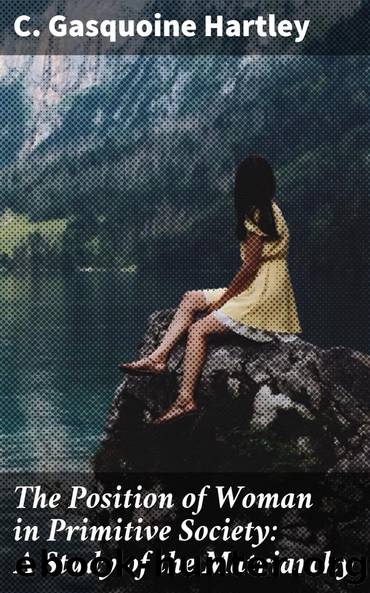The Position of Woman in Primitive Society: A Study of the Matriarchy by C. Gasquoine Hartley

Author:C. Gasquoine Hartley [Hartley, C. Gasquoine]
Language: eng
Format: epub
Tags: Nonfiction, New Age, Religion & Spirituality, History, Women, Fiction & Literature
ISBN: 9781465536167
Google: kwbDDwAAQBAJ
Publisher: Library of Alexandria
Published: 2020-03-16T04:00:00+00:00
âIf the visitor, mounting the ladder steps, looks in at one of the doors of the separate dwellings, he may see seated beyond the family hearth the mother and her children, eating the midday meal, and very likely the father, who may have been doing a turn of work in his wifeâs rice-plot. If he is a kindly husband, he is there much as a friendly visitor, but his real home remains in the house in which he was born.â
The husband has no permanent residence in the womanâs house, and at dusk each evening the men may be seen walking across the village to join their wives and families. The father has no rights over his children, who belong wholly to the wifeâs suku, or clan. But this in no way implies that the father is unknown, for monogamy is the rule; as is usual the question is one rather of social right than of relationship. The maternal uncle is the male head of the house, and exercises under the mother the duties of a father to the children. The brother of the eldest grandmother is the male head of the family settlement and the clan consists of a number of these families. It would seem that these male rulers act as the agents of the female members, whose authority is great. This power is dependent on the inheritance; as is the descent, so is the property, and its transmission is arranged for the benefit of the maternal lineage. For this reason daughters are preferred rather than sons.
This account of the Padang Malays may be supplemented by the Jesuit missionary De Maillaâs description of the maternal marriage in the Island of Formosa.[84] Speaking of this marriage, McGee says: âIf it had received the notice it deserves, it might long ago have placed the study of maternal institutions on a sounder basis.â
âThe Formosan youth wishing to marry makes music day by day at the maidâs door, till, if willing, she comes out to him, and when they are agreed, the parents are told, and the marriage feast is prepared in the brideâs house, whence the bridegroom returns no more to his father, regarding his father-in-lawâs house as his own, and himself as the support of it, while his own fatherâs house is no more to him than in Europe the brideâs home is henceforth to her when she quits it to live with her husband. Thus the Formosans set no store on sons, but aspire to have daughters, who procure them sons-in-law to become the support of their old age.â
Download
This site does not store any files on its server. We only index and link to content provided by other sites. Please contact the content providers to delete copyright contents if any and email us, we'll remove relevant links or contents immediately.
Harry Potter and the Goblet Of Fire by J.K. Rowling(3023)
Unfinished: A Memoir by Priyanka Chopra Jonas(2911)
Never by Ken Follett(2868)
The Man Who Died Twice by Richard Osman(2289)
Machine Learning at Scale with H2O by Gregory Keys | David Whiting(2263)
Fairy Tale by Stephen King(2058)
Will by Will Smith(2031)
Rationality by Steven Pinker(1759)
The Storyteller by Dave Grohl(1654)
The Dawn of Everything: A New History of Humanity by David Graeber & David Wengrow(1563)
The Dark Hours by Michael Connelly(1561)
The Stranger in the Lifeboat by Mitch Albom(1524)
Cloud Cuckoo Land by Anthony Doerr(1428)
The Becoming by Nora Roberts(1323)
Friends, Lovers, and the Big Terrible Thing by Matthew Perry(1320)
Einstein: His Life and Universe by Walter Isaacson(1310)
Crying in H Mart by Michelle Zauner(1309)
New Morning Mercies: A Daily Gospel Devotional by Paul David Tripp(1299)
A Short History of War by Jeremy Black(1295)
